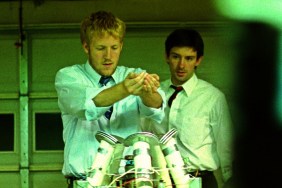Shane Carruth as Aaron
David Sullivan as Abe
Casey Gooden as Robert
Anand Upadhyaya as Phillip
Carrie Crawford as Kara
Jay Butler as Metalshop Worker
Ashley Warren as Hostess
Samantha Thomson as Rachel Granger
Chip Carruth as Thomas Granger
Jack Pyland as Aaron’s Co-worker
Keith Bradshaw as Clean Room Technician
Brandon Blagg as Will
Jon Cook as Will’s Cousin
John Carruth as Man On Couch #1
Juan Tapia as Man On Couch #2
Story:
Scientists and best friends Aaron and Abe (director Shane Carruth and David Sullivan) are trying to find a scientific breakthrough that will allow them to quit their day jobs, when a series of side effects allows them to accomplish some thing they never dreamed possible. As they try to find ways to take advantage of their new discovery, cracks start to form in their friendship as they begin to question the morality and implications of their actions.
Analysis:
That plot may sound a bit vague and maybe not so enticing, but that’s only because Primer is the type of movie where the less you know going in, the more likely you’ll be surprised by where things lead.
The crux of the story is that science can be a tricky thing. Besides dealing with unexpected side effects, it’s about how scientists deal with discovering something seemingly impossible and try to find ways to use that information, while dealing with the repercussions when compromises need to be made in their moral compasses.
The first twenty minutes of Primer might be hard for some to get through (at least the first time), if only because the characters use a lot of scientific jargon as they assemble their mysterious box using parts from household items like the microwave and the refrigerator. Talk of scientific results and protein build-up might be tedious for some, although it sets the tone and pulls you in, because you realize that there must be something important to the words being said.
Understanding the premise of what the two guys are trying to create and what they end up with is key to understanding what happens afterwards, so it’s important to pay close attention when Abe explains to Aaron how their invention is defying the laws of logic and physics. Being able to understand this principle makes the dark twist and the movie’s climactic pay-off that much more intriguing. Because of this, Primer is one of those movies that practically demands a second viewing, because the ending is even more amazing when you see that all of the clues are there beforehand and that the piece actually do add up when they’re put together.
The entire movie has a distinctively dark look and tone, narrated by a strange detached voice, which is explained later. The low budget-reported to be around $7,000–means that the scientific props are a bit low-tech and simplistic, but that only adds to the realism, while also letting the movie be more character and script driven. While neither director Shane Carruth nor David Sullivan, as the seemingly naïve Abe, will be winning Oscars for their performances, the dry and deliberate delivery of their dialogue greatly adds to the dark mood of the movie.
It’s hard not to make comparisons to movies like Darren Aronofsky’s PI and Richard Kelly’s Donnie Darko, because Carruth uses quantum physics and scientific theory just as creatively to tell a human story about trust between the two friends. Sharper moviegoers and science fiction fans should greatly appreciate Carruth’s more mind-blowing theories, which are on the same plane of ideology as William Gibson and Phillip K. Dick.
The Bottom Line:
With a highly inventive premise and a rather unique execution, Primer is the most intelligent scientific fiction film in quite some time. It requires a bit more concentration than other movies to understand the concepts being expressed, but in the end, it all pays off, because being able to keep up with the story guarantees you’ll be hooked. Much like the first time you see Memento or The Matrix, Primer will blow your mind, making you want to see it again immediately.










